|
Thanks for the Memory No 7:
Sounds of the 70’s with The Band of Yorkshire Imperial
Metals.
By Chris Helme
When was the last time you had any of your vinyl records out? –
I suppose I have about 300 now and like many other nostalgic brass
band enthusiasts I enjoy giving one a spin every now and then. One
of my particular favourites was recorded in 1973 on the Decca label
in the Sound of Brass Series; in fact it was Volume 6 - The Band
of Yorkshire Imperial Metals conducted by Trevor Walmsley DFC.
This record features no less than six soloists: Roy Roe on Soprano
playing Musetta’s Waltz from La Boheme; Graham Walker their
Principal Cornet plays two solos firstly his own arrangement of
Oscar Boeme’s 1st movement from his Trumpet Concerto in F
Minor and then Willow Echoes arranged by Frank Simon; Fred Muscroft
assistant principal cornet who in his own inimitable style plays
Del Steiger’s Carnival of Venice; Carl Bamford on Flugel playing
Indian Summer arranged by George Hespe; Ian Craddock their Principal
Euphonium with Bellstedt’s Napoli and William Rodgers the
band’s Principal Trombone player who performs another arrangement
by George Hespe, Melodie de Caprice. I have listened to this record
many times and still admire and enjoy their top class performances
however, I recently thought, what ever happened to these players
since this recording – in the world of brass bands these players
were household names during the 1970’s – where are they
now - are they still involved in ‘banding’ or have they
retired gracefully leaving their glory years to the history books.
Let us start from the beginning with the band it self - it was
on March 18, 1936 that a story appeared in the Leeds press saying
that the Yorkshire Copper Works at Stourton had formed its own brass
band thanks largely to the efforts of Kenneth Fraser who was to
become the band’s first President.
The Yorkshire ‘Imps’ Band as it was affectionately
known was formed from some of the members of the local Stourton
Memorial Band – in fact it was expected that if you worked
at the old copper works then you would move to the new works band.
The birth of the new band unfortunately led to the demise of the
old Memorial Band.
The band’s first set of instruments it is said cost the
company £2,500 but that was not their only expense because
they also provided each member with two uniforms - one for the summer
and one for the winter.
During its long history the band has been conducted by a number
of well known names from the brass band world which included: George
Hespe; William Halliwell who they engaged for contest work; H. Tompkins;
A. H. Whitehead; B. Burns; Trevor Walmsley; Denis Carr; Peter Kitson;
John Pryce Jones; James Scott and Ray Farr.
It has been documented that the band took part in their first contest
in October of 1936 in Guiesley a small village on the outskirts
of Leeds and Bradford a community perhaps more famous for the original
Harry Ramsden’s fish and chip shop and restaurant, a contest
they won. Little did those players realise then that it would only
be a wait of two years when they too would be performing at the
highest level. Although not amongst the prizes they were now on
the first rung of the ladder following their performance of ‘Owain
Glyndwr’ R. Maldwyn Price’s test piece at the 1938 British
Open Championships at Belle Vue, under the baton of Willie Wood.
An industrial merger in 1958 brought them a new title – the
Band of the Yorkshire Imperial Metals but this was changed again
in 1980 to Yorkshire Imperial Band. However, following the combination
of the Yorkshire Imperial Band and Rothwell Band in 1999 the band
changed its name again to incorporate their new sponsors name David
Urquhart Travel. In more recent times they have changed their name
again to make it well let us say less of a mouthful for compéres
and audiences – today they are known as Yorkshire Imperial
Urquhart Travel Band but retain its traditional name, Imps.
After what was described as a lean period in terms of awards from
the 1950’s the band went on to be one of the leading bands
in the country.
It had successive wins at Belle Vue in 1970 playing under the baton
of Trevor Walmsley DFC - Herbert Howells test piece ‘Pageantry’
and again in 1971 playing Eric Ball’s test piece ‘Festival
Music’ but despite these high achievements they had to wait
until 1978 then playing under the baton of Denis Carr to finally
lift the national title playing ‘Checkmate’ by Sir Arthur
Bliss playing off number 9 and taking it back to their home base
in Leeds.
For the statisticians Besses o’th’ Barn Band with their
conductor Roy Newsome was placed second with Grimethorpe under Stanley
Boddington coming in third. In 1980 they went on to achieve their
third win at the British Open Championships playing Robert Simpson’s
test piece ‘Energy’ under the baton of John Pryce-Jones.
In 1981 again with John Pryce-Jones conducting Derek Bourgeois test
piece ‘Blitz’ they were placed a commendable fourth
behind the ultimate winners of that year Black Dyke. Under Jim Scott
they went on to be placed third again behind familiar winners Black
Dyke playing John McCabe’s ‘Cloudcatcher Fells’.
It has to be said that between 1970 and 1980 they were the band
to beat – they had four major victories, Yorkshire area champions
five times out of seven along with their triple success at the Edinburgh
Festival Invitation Contest.
So having looked back on the band it self just where are those
fine soloists today:
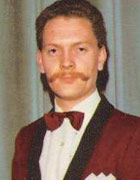 Principal
Cornet – Graham Walker Principal
Cornet – Graham Walker
Graham was born in Elsecar near Barnsley in 1946 and at the age
of ten joined the local Elsecar Main Colliery Band. He made rapid
progress and by the age of 16 had joined Grimethorpe under their
legendary conductor George Thompson.
Having decided to make a career out of music he took a music course
in Huddersfield and then in 1963 enrolled at the Royal Manchester
College of Music to study the trumpet. During his three years at
College he played with the Royal Liverpool Philharmonic Orchestra.
In 1966 he took a teaching post with the West Riding County Council
Education Department where his role was to build up instrumental
teaching in the Selby and York areas. This new role also gave him
the opportunity of returning to the world of brass bands - he joined
the York Railway Band as their principal cornet and deputy conductor.
In 1969 he was playing first trumpet for Handel’s Messiah
at Yeadon Town Hall alongside Fred Muscroft who mentioned to him
that Imps were looking for a new principal cornet player and was
he interested. Initially saying he would think about it, a couple
of weeks later he went to a band rehearsal and was later offered
the job. That was the start of a very successful nine year stay
with the band during which time he was often asked to join other
top bands but always turned them down.
Graham felt the band was playing well in those days and thought
they could win one of the major contest titles. “…The
band was playing as a tightly knit team and any band playing like
that must eventually win…” – not long after the
did band become the British Open Champions of 1970.
This was the start of a winning streak, the second Open followed
and then the National finals at London in 1978. Looking back Graham
firmly believes that the band would have been worthy winners of
the 1973 Open as well. Few players get the chance of playing with
a National Champion band and when Imps took the honour in 1978 he
certainly felt that was the one to win.
He was the Champion Soloist of Great Britain 1971/72 when he played
his own arrangement of Oscar Boeme’s ‘Trumpet Concerto’.
Looking back he rates Derek Garside as one of the main influences
in his cornet playing career – his sound and technical ability
was second to none. Back in those days by listening to the principal
players of the top bands you could tell instantly which band it
was – something which he feels is not quite as easy these
days.
During his playing career he won most things at the highest level,
he was invited regularly to be the guest soloist in Switzerland,
Denmark and Norway he made a number of recordings with both Imps
and as a member of the Virtuosi Band and took part in countless
radio broadcasts. He has conducted a number of bands and adjudicated
on many occasions.
Graham Walker has been a top class player and even now in retirement
on the East Coast he occasionally still plays when the opportunity
presents itself. He firmly believes that you can have a band full
of individual stars but unless they perform as a team – know
each others faults and strengths - almost breathe as one –
that is the test of a good band.
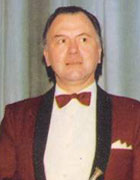 2nd
Solo Cornet – Fred Muscroft 2nd
Solo Cornet – Fred Muscroft
Fred was born in London but spent his formative years in the Leeds
area where he was brought up in a musical household. His father
was the Solo Cornet in the Life Guards and a professional musician.
Being so busy he did not have the time to teach young Fred how to
play the cornet but his grandfather Oliver had in his younger days
played Soprano in the old Armley & Wortley Band in Leeds and
gave Fred his early tuition. Fred well remembers his grandfather
telling him about the day the band played ‘Zampa’ at
the Crystal Palace in the 2nd section contest. With his grandfather
playing ‘Sop’ and his Dad playing ‘Solo Cornet’
that day, it was inevitable that young Fred would become a brass
player as well.
He made good progress and by 1937 he was the Principal Cornet for
the now defunct Leeds Model Band. It was whilst he was a member
of this band that on June 23rd 1935 he broadcast his first solo
playing that well known cornet solo by Harold Moss ‘The Nightingale’
aged 11. He later went to London to study music at the Royal Academy
and in 1942 he joined the Scots Guards where he served for 22 years,
many of those years as their Principal Cornet. Whilst Fred was gradually
building up his freelance work in London where he was regularly
playing with orchestras and big bands the music scene began to change
towards the end of his service career. During the early 1960’s
he became disillusioned which resulted in he and his wife making
the decision to move back north where they both considered to be
their real home.
Almost straight away he was contacted by the Imp’s band controller
Tim Shackleton about joining them. It was 1964 and he was with Imp’s
at the British Open Championships at Belle Vue playing Thomas Keighley’s
test piece ‘Lorenzo’ – no prizes that year. The
man who changed everything for the band was Trevor Walmsley he came
in 1965 and took the band back to Belle Vue playing ‘Saga
of the North’ and they came in 5th and from that day on the
band was only going in one direction and that was up.
Whilst in came Graham Walker, Roy Roe and Tom Gomersal others retired
or left, the new team gelled together so well Fred is of the opinion
they did without doubt become one of the best bands in the country.
In 1970 Eric Ball said after their British Open performance ‘…it
was magical…’ – all the soloists were brilliant
and Roy Roe gave the finest exhibition of Soprano playing Fred had
ever heard. Again in 1971 as far as Fred is concerned Graham Walker
played himself into the ranks of the truly great cornet players
- what a performance. Trevor read the music brilliantly and took
the trouble to research the meaning of ‘Cortege’, adding
this to the band’s unique sound making it a truly memorable
performance. The only sound coming close to Imp’s back in
those days Fred believes was the old CWS (Manchester) Band under
Alex Mortimer.
Throughout Fred’s long and distinguished musical career he
never forgot those who had inspired him – Denis Brain the
French Horn player who he was at the Academy with and still remembers
his friend’s maxim ‘…when they say it can’t
be done go and find a way of doing it...’ – Willie Lang,
Maurice Murphy two cornet players who also went on to master the
art of playing the trumpet as well. Ian Bousfield who joined Imps
as a youngster and has since matured into one of the finest trombone
players in the world.
Today Fred is still enjoying his playing as a member of the Bridlington
Brass Ensemble a ten piece brass group and is still kept busy arranging
pieces for them just as he did for Imps all those years ago, arrangements
which added to many the band’s unique concert programmes.
Whilst Fred is not quite yet an octogenarian the group’s bass
player is 82 year old Joe Foster who played for Carlton Main and
Grimey (Grimethorpe) and often shares his memories with young Fred.
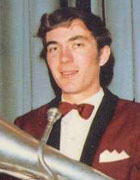 Principal Euphonium - Ian Craddock
Principal Euphonium - Ian Craddock
Ian was born in Teversal a small mining community in Nottinghamshire.
He came from a musical family, his father played the trombone in
a number of local brass and dance bands and in his later years he
was also a brass teacher and conductor. Ian’s mother was a
regular member of the local Methodist church where she often entertained
with her poetry and singing.
Initially starting his musical career on the piano aged nine which
he still enjoys playing – after five years he started on the
Euphonium. Having spent five years reading piano music he was able
to adapt to a single line of music quite easily which saw him make
rapid progress and following a move to Yorkshire he was invited
to join the Carlton Main & Frickley Colliery Band.
He was now being taught by Jack Atherton who also conducted the
band – they had band engagements in London and Edinburgh,
these were busy times. He also made friends with the band’s
principal cornet player James Shepherd - they were both part of
the band’s successful quartet.
After several years at Carlton he was then invited to Yorkshire
Imperial Metals Band as their principal Euphonium, a position he
was to hold with distinction for the next fifteen years. During
which time they won the British Open Championship three times, as
well as a National Championship victory. Ian also played with the
famous ensemble 'Versatile Brass' at venues in Monte Carlo and Berlin.
Ian was in regular demand for solo work with performances across
Scandinavia and Europe.
He left Imps to pursue his commercial career during which time
he turned his musical attention to conducting. Firstly with Crofton
Silver and then with Queensbury Music Centre where he and the band
had tremendous success both in the contest field and in the many
concerts he led them in. Following on from this success he was then
invited to lead Brodsworth Colliery Band, a top section band back
in those days. Their first major success together was winning the
Leeds Tetley Championship Section and then going on to a top ten
place in the British Open.
After two years he resigned and was invited to conduct Williams
Fairey Band with Major Peter Parkes as the band professional conductor.
During his time with Fairey’s he helped to take the band up
the rankings from number 5 to top spot.
He can easily recall this first rehearsal at Imps because it really
annoyed him at the time simply because it had been cancelled and
no one told him – travelling all the way from South Elmsall
was no joke in those far off days but it got better – a lot
better.
Ian recalls that the 1970 Open Championship win came as a surprise
not only to the band but to many of the audience as well –
‘…we were not a favourite…’ and to prove
the pundits we were not a flash in the pan we won it again the following
year. This win finally put the band almost at the top or certainly
amongst the elite of the day. The band had a team which barely changed
and the spirit amongst the players was tremendous. Led by Trevor
Walmsley, a man who never shouted he just rolled up his sleeves
and got on with it.
As a youngster Ian was taken to brass band concerts by his father
where he sat in amazement listening to Black Dyke, CWS (Manchester)
Band and Munn and Felton’s Band and it was these bands along
with his father’s enthusiasm that inspired his own playing
and his will to get to the top.
Receiving a congratulatory letter from another of his musical heroes
Trevor Groom following his performance of Philip Sparke’s
Fantasy for Euphonium was something special to Ian and something
he still thinks about all these years after.
These days Ian is very active in the world of athletics his daughters
having been Yorkshire Champions. He has the same enthusiasm for
them as his father had for him by hoping they too can become National
Champions one day.
There have been many high points in Ian’s career and many
amusing moments – none more so than on the occasion he was
to play a solo whilst playing with Imps at a large venue on the
outskirts of Birmingham. Just as he was to be introduced by Trevor
Walmsley he indicated to him that he had lost his solo music and
there were no spare copies. However, the show must go with Trevor
informing the audience of the dilemma but not to be disheartened
he told the audience this would be Ian’s first solo without
any music – Ian prefers not to mention how he felt at this
point but as he stood up to arrange the music stand he caught sight
of the music rolled up in the bell of his instrument – relief.
Performing solos infront of his parents, aunts and uncles was always
something special both for him and especially for them.
In recent years he has become a well respected adjudicator, adjudicating
not only at the highest level in national contests in the UK but
also in Europe. He is also having some success as the musical director
of the Hebden Bridge (Walkley Cloggs) Band, a band with a long history
and fine traditions.
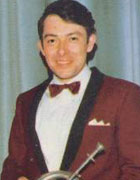 Flugel
Horn – Carl Bamford Flugel
Horn – Carl Bamford
Carl’s father played with the old Yorkshire Copper Works
Band and later when it was re-named Yorkshire Imps. Young Carl was
a regular visitor to the bandroom with his dad and banding was a
central part of his family life. He started playing when he was
10 and joined the Yorkshire Imps from Leeds Model Band just after
the British Open in 1966. Along with his pal Barry Waddington as
third and fourth man down respectively to principal cornet Phil
McCann and his assistant Fred Muscroft – nine months later
however he transferred on to Flugel Horn.
During his early days along with other members of the band he would
visit the Stourton Hotel after the rehearsal and stew over a drink
what it would be like if they could ever win the ‘…Open…’
and in Carl’s case when they finally did become British Open
Champions he could barely sleep for a week after from the excitement
of the occasion. Carl recalls that the second time was totally different
from the first – Festival Music had a very good Flugel part,
the third win was absolutely fabulous – the band was conducted
by John Pryce Jones who Carl describes as being a great man to play
for.
Looking back over his musical career Carl points to Maurice Murphy,
Norman Ashcroft and Teddy Gray as just three of his musical influences
along with his Dad. Of all the highlights he places this long playing
record and the Yorkshire Area finals when the test piece was Shinning
River and Imps scored an incredible 199 points. Another highlight
was when Major Peter Parkes took the band, a period when he felt
the band was playing to an even higher standard. These days he is
playing with Timperley Band in Cheshire and still enjoys the thrill
of winning.
Everyone has heard the saying ‘…given the boot…’
just what the origins are of that saying have probably been lost
in the mists of time but Carl recalls many years ago at one rehearsal
someone found an old workman’s boot in the bandroom. Just
who’s idea it was has long since been forgotten but from that
night if you made an obvious mistake at Imps you were presented
with that same boot. He recalls the comradeship – a great
set of mates.
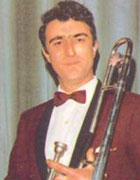 Principal
Trombone – William Rodgers Principal
Trombone – William Rodgers
Bill Rodgers is a Leeds lad through and through having been born
there and still living there. As a young lad he followed what had
become almost a tradition in the Rodgers family with the male members
all playing brass instruments.
He began playing in 1948 then aged 12 on the Baritone with Kippax
Band, a band which in those days was conducted by Norman Morley
who in his own playing days had played Eb Bass with St Hilda’s
Band. As Bill progressed he successful auditioned for the National
Youth Band under the baton of Dennis Wright and Eric Ball. During
these early years his father was playing trombone at Kippax and
with his own mouthpiece being a similar size to that of the trombone
he decided to give it a go. By the time he was between 18 and 19
years old his father came off the trombone - Bill by this time had
self taught himself to such a standard he was the obvious choice
for promotion to his father’s position.
He first came to the notice of the Imps during the late 1950’s
and early 1960’s in the days when Kippax were really busy
and some of the lads from Imps would come down and listen and help
out. Hearing just how good this self taught trombonist was in 1961
he was invited to play with them and shortly afterwards was offered
the position of Solo Trombone on a full time basis.
Bill recalls that very first rehearsal when he was determined to
prove he was good enough – something he certainly did as he
was their regular Solo Trombone player until he left in 1980. During
his 17 years he can recall all the great players that helped to
make the band into the household name and to help raise his own
standard of playing. Of all the musicians over his long career that
has heard he has to say without any doubt that his own musical hero
is the legendary trombone player Don Lusher.
The band had many high points - the concerts, the contests and
playing all those special arrangements written by Fred Muscroft
and knowing they had never been seen or played before made every
concert performance unique. A notable recollection was in 1966 when
the band had been engaged for a full week at Edinburgh to play in
the Princess Gardens. Many readers will remember that at the end
of these week long series of concerts bands were invited to take
part in a March, hymn and selection contest. When each band was
ready and on the signal they would set off playing their chosen
contest March from under the Floral Clock at Waverley Street Station.
That particular year the band’s percussionist could not attend
so they engaged a professional orchestral percussionist for the
week.
For the contest their usual drill was a double tap to bring the
band to a state of readiness and two three beat rolls to set the
tempo and away we go. However, the hired percussionist had never
done a job like this before so Fred Muscroft the doyen of the Imps
band had previously served 22 years in the Scots Guards happily
gave him some instant tuition – then we were ready –
but oh dear, the double tap went fine but the two three beat rolls
went at such a pace that when they set off marching or was it running
in any event it could only be described as a gallop. Well, the audience
lining the streets of Edinburgh burst out into fits of laughter.
Needless to say they failed to win a deportment prize that day but
went on to win three first for their playing performances.
Looking back Bill feels that winning Belle Vue was harder than
the National Championships because all the top bands were invited
to the Open. Then the thrill of winning the National and having
to go back on stage to play a winning performance was truly magic
and moments he will never forget.
Bill finally put his mouthpiece away after he played at the Yorkshire
2002 Area Contest in Bradford having played 2nd Baritone for his
childhood band Kippax and helping them to qualify for the 1st section
finals.
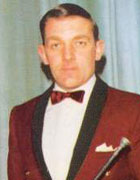 Soprano
Cornet – Roy Roe Soprano
Cornet – Roy Roe
Roy began his musical career when he started taking singing lessons
and by all accounts as a young lad he had a tuneful singing voice.
His early musical influence of course came from his father who sang
in a local male voice choir - adding to the music making in the
Roe household was his mother who played the piano, not something
Roy wished to pursue at the time. His singing talents led him to
entering a number of local singing competitions where he was quite
successful winning a number of prizes. He started playing a brass
instrument with the Salvation Army at the age of eight, having been
taken down to the band rehearsal by a friend and being so impressed
with what he saw and heard.
At the age of 13 he moved to his local colliery band in his home
village of Dinnington near Sheffield and as his standard of playing
progressed he successfully auditioned to join the National Youth
Band. His rapid progress was soon noticed by a number of the country’s
leading bands and over the next few years enjoyed spells with both
Fodens and Fairey’s before he finally joined Imps in 1969.
There are examples throughout the history of brass bands how certain
players who have started playing one instrument but end up playing
another not necessarily by design but more by chance or –
well I just fancied a go on it - and then make a terrific success
of the change. Roy fits in to that category, by the time he was
14 going on 15 years old for no other reason than – I fancied
having a go – he decided to move on to playing the Soprano
filling the vacant position. So he became the new Dinnington Colliery
Band Soprano player – although his father was initially not
too pleased with Roy’s decision with his rapid progress he
soon grew to accept it.
Roy can recall that first rehearsal with Imps now even thought
it is 33 years ago and being made so very welcome by the Musical
Director Trevor Walmsley. Whilst he told Roy that he would be a
real asset to the band as a player he hoped that his years of experience
would also help the younger members of the band.
As with all bands they too had their ups and downs – he remembers
that when they were rehearsing Spectrum for the 1969 British Open
Trevor had the band practicing in different parts of the factory
for various effects – sadly it was to no avail based on the
final positions when the results were given. In stark contrast 1970
was their year – after lots of hard work – a number
of improvements in some departments and a test piece that really
suited both the band and conductor – the result of course
saw them take the title of British Open Champions for the first
time.
Another memorable year for Roy and the band was in 1978 at the
National Championships. Owing to Trevor being unavailable the band’s
associate conductor Denis Carr had the opportunity of making his
presence felt. That year it was a particularly difficult piece and
for those who cannot remember it was of course ‘Checkmate’
by Sir Arthur Bliss. Denis really worked at the band for that one.
That was the same year the band recruited a new trombone –
a young 16 years old called Ian Bousfield – the second movement
of Checkmate is notoriously difficult but as Roy recalls Ian made
it sound easy, such a performance from someone so young was incredible.
Of course the whole band did well and finally pulled off the big
one playing off number 9 they beat off Besses o’th Barn with
Roy Newsome; Grimethorpe and Stanley Boddington; Fairey Engineering
and the Wee Professor Walter Hargreaves; Fodens with Jim Scott and
in sixth place St Dennis’s with Eddie Williams. Roy believes
this was certainly the contest performance that was so memorable
for all sorts of reasons and was a pinnacle of the stature of what
was a fine band.
Throughout his musical career there have been many people whose
influence he feels he has benefited from. Just some of these marvellous
people include Trevor Walmsley; Denis Carr; Norman Ashcroft –
Principal Cornet at Fairey’s; Teddy Gray – Principal
Cornet at Foden’s; Charlie Cook – Foden’s Soprano
from the late 1930’s and Ted Swindels – Foden’s
BBb Bass who was one of the senior members of the band during Roy’s
tenure at Foden’s and taught him a lot about banding generally
and was someone who Roy considered to have been a fatherly figure
back in those very early 1960’s.
Throughout his musical career there have been many musical arrangements
written specially for him by Derek Broadbent and Fred Muscroft.
Roy had many successes Imps and the other bands he played with
– the highlights included obviously the 3 Nationals, 3 British
Open’s which stand at the top and then of course there many
others as well along with the many memorable Whit–Friday March
contests. Between 1960 and 1991 Imps won 55 firsts; 34 seconds;
20 thirds and 2 fourths which at that time made the band third in
the top ten list behind Brighouse & Rastrick and Black Dyke.
Roy left Imps in 1979 to join Brighouse and Rastrick after what
was a tremendous ten year reign on Soprano when he played a solo
on every concert programme. Although he now only plays in the comfort
and privacy of his own home he is still kept very busy on the adjudicating
circuit and with the knowledge that his two sons have followed in
his footsteps he just as his parents were proud of him as he stepped
out to the stage at Dinnington all those years ago he his equally
proud of his two sons achievements.
Roy’s lasting memory that he will take with him from his
own playing days will be the common factor felt by many who have
been involved in the world of brass bands the music and of course
the friendship.
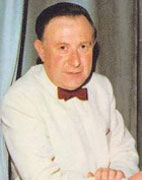 Musical
Director – Trevor Walmsley DFC Musical
Director – Trevor Walmsley DFC
He was born in Cheshire and followed his father into the Salvation
Army playing the cornet. He joined Yorkshire Imperial Band in 1965
and during his time the band had a growing reputation both on the
concert stage and the contest platform. The pinnacle of his 11 years
at Imps was winning the 1970 and 1971 British Open Championships
at Belle Vue. He also conducted the band to a triple success at
the Edinburgh Festival Invitation Contest together with regional
successes at both regional and national contests.
He left Imps in 1976 to replace Derek Garside as Professional Musical
Director at CWS (Manchester) Band and was also a representative
for Boosey and Hawkes on the instrumental side. During his career
he was also the resident conductor of both Brighouse and Rastrick
and Black Dyke.
He was a quite man but one who had the knack of skilful man management
– for a period of six years the band personnel at Imps remained
unchanged – a team that breathed together.
He was awarded the DFC and Bar during the Second World War. He
died in June 1998 aged 76 years.
If you have the opportunity look out for this very special record
of playing by a fine team of six soloists or if you still have it
tucked away in the loft get it out just one more time you cannot
fail to be impressed.
Recently I asked readers for information about that fine trombone
player the late Harold Laycock - well thankfully I am now in contact
with his eldest grand daughter and reminiscing about her grandfather’s
playing days. I am now trying to locate copies for her of the few
solo recordings he did whilst playing for the legendary St Hilda
Colliery Band during the 1920’s. If any one can help I can
be contacted on chrishelme@brighouse.fsnet.co.uk
Following a number of requests please note that all the individual
stories I have written in the ‘Thanks for the Memory’
series are available for sale as individual spiral bound copies
- £5 + postage and packaging = £6
Previous 'Thanks for the Memory' articles:
• No. 6: David Read - more...
• No. 5: Derek Southcott - more...
• No. 4: Rowland Jones - more...
• No. 3: Louis Allison - more...
• No. 2: Willie Barr - more...
• No. 1: Derek Garside - more...
© Chris Helme 2003
© 4BarsRest
 back
to top back
to top
| 
